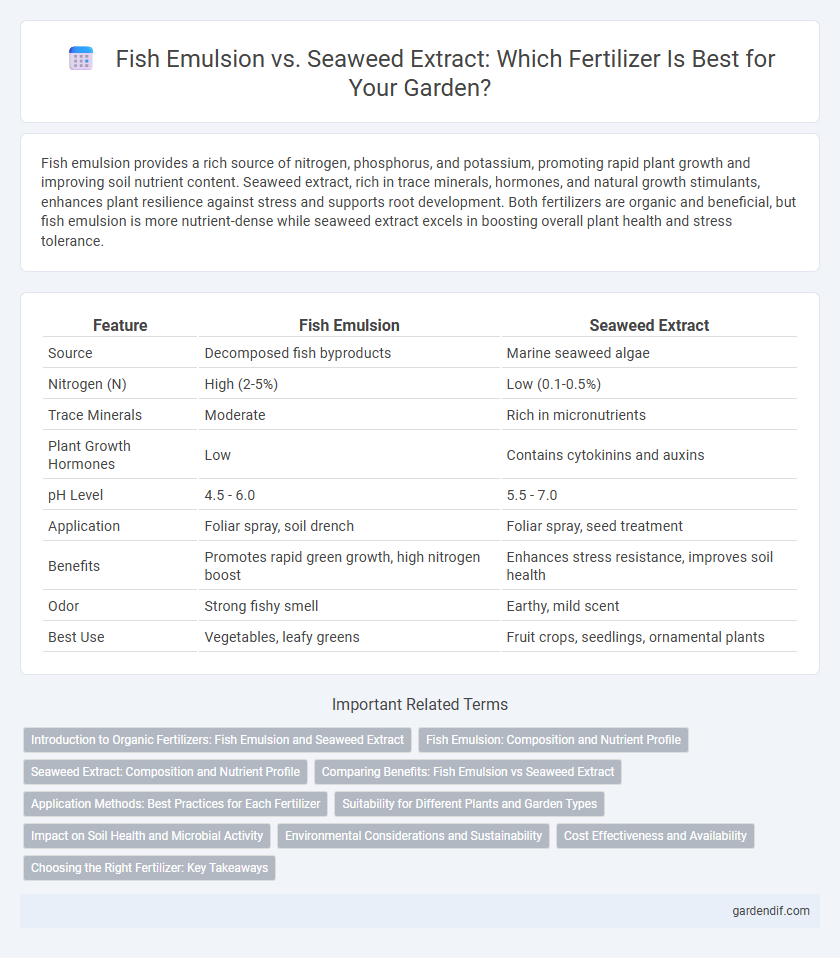
Fish emulsion vs Seaweed extract Illustration
Fish emulsion provides a rich source of nitrogen, phosphorus, and potassium, promoting rapid plant growth and improving soil nutrient content. Seaweed extract, rich in trace minerals, hormones, and natural growth stimulants, enhances plant resilience against stress and supports root development. Both fertilizers are organic and beneficial, but fish emulsion is more nutrient-dense while seaweed extract excels in boosting overall plant health and stress tolerance.
Table of Comparison
| Feature | Fish Emulsion | Seaweed Extract |
|---|---|---|
| Source | Decomposed fish byproducts | Marine seaweed algae |
| Nitrogen (N) | High (2-5%) | Low (0.1-0.5%) |
| Trace Minerals | Moderate | Rich in micronutrients |
| Plant Growth Hormones | Low | Contains cytokinins and auxins |
| pH Level | 4.5 - 6.0 | 5.5 - 7.0 |
| Application | Foliar spray, soil drench | Foliar spray, seed treatment |
| Benefits | Promotes rapid green growth, high nitrogen boost | Enhances stress resistance, improves soil health |
| Odor | Strong fishy smell | Earthy, mild scent |
| Best Use | Vegetables, leafy greens | Fruit crops, seedlings, ornamental plants |
Introduction to Organic Fertilizers: Fish Emulsion and Seaweed Extract
Fish emulsion and seaweed extract are popular organic fertilizers known for their rich nutrient profiles and soil-enhancing properties. Fish emulsion offers high levels of nitrogen, phosphorus, and potassium, promoting vigorous plant growth and improved soil microbiology. Seaweed extract provides essential micronutrients and growth hormones that enhance root development, stress tolerance, and overall plant health.
Fish Emulsion: Composition and Nutrient Profile
Fish emulsion is a concentrated organic fertilizer derived from the byproducts of fish processing, rich in nitrogen, phosphorus, and potassium essential for plant growth. Its nutrient profile typically includes around 5% nitrogen, 2% phosphorus, and 2% potassium, along with trace minerals and amino acids that promote soil health and microbial activity. Compared to seaweed extract, fish emulsion provides a more substantial and immediate source of macronutrients, making it highly effective for boosting vegetative growth and overall plant vigor.
Seaweed Extract: Composition and Nutrient Profile
Seaweed extract contains a diverse composition of trace minerals, amino acids, and natural plant growth hormones such as cytokinins and auxins that enhance plant development. Its nutrient profile is rich in potassium, nitrogen, and phosphorus, which are essential for improving soil health and boosting crop yield. Unlike fish emulsion, seaweed extract is valued for promoting stress tolerance and improving overall plant resilience without the strong odor.
Comparing Benefits: Fish Emulsion vs Seaweed Extract
Fish emulsion provides a rich source of nitrogen and phosphorus, promoting vigorous leafy growth and improved root development, while seaweed extract delivers essential micronutrients and natural growth hormones that enhance stress tolerance and stimulate overall plant vitality. Fish emulsion decomposes quickly, offering fast nutrient availability, whereas seaweed extract improves soil microbial activity and increases nutrient uptake efficiency. Combining both can optimize plant health by balancing immediate nutrient supply with long-term growth stimulation and environmental resilience.
Application Methods: Best Practices for Each Fertilizer
Fish emulsion is best applied as a soil drench or foliar spray, targeting nutrient uptake directly through roots and leaves, with careful dilution (usually 1:10) to avoid plant burn. Seaweed extract works effectively when foliar sprayed to enhance hormone stimulation and stress resistance, typically diluted to 1:100 for optimal absorption. Both fertilizers benefit from early morning or late afternoon applications to maximize nutrient uptake and minimize evaporation.
Suitability for Different Plants and Garden Types
Fish emulsion provides a high nitrogen content ideal for leafy vegetables and fast-growing plants, promoting vigorous foliage development. Seaweed extract supplies trace minerals and natural growth hormones suitable for flowering plants, fruiting crops, and stressed or drought-prone gardens. Gardeners often choose fish emulsion for vegetable beds and lawns, while seaweed extract excels in ornamental gardens and organic fruit orchards.
Impact on Soil Health and Microbial Activity
Fish emulsion, rich in nitrogen and amino acids, promotes rapid microbial growth and enhances soil nitrogen availability, thereby boosting soil fertility. Seaweed extract contains polysaccharides and micronutrients that stimulate beneficial microbial populations and improve soil structure by increasing moisture retention. Both fertilizers support soil health, but fish emulsion primarily accelerates nutrient cycling, while seaweed extract enhances microbial diversity and resilience.
Environmental Considerations and Sustainability
Fish emulsion and seaweed extract are both organic fertilizers with distinct environmental impacts and sustainability profiles. Fish emulsion, derived from fish byproducts, promotes nutrient recycling but may contribute to overfishing if sourced unsustainably, while seaweed extract is renewable and supports marine ecosystems without depleting fish populations. Prioritizing certified sustainable sourcing and minimizing nutrient runoff are critical for reducing ecological footprints associated with both fertilizers.
Cost Effectiveness and Availability
Fish emulsion offers a cost-effective, nitrogen-rich fertilizer option, widely available at garden centers and online due to its popularity among organic gardeners. Seaweed extract, although typically more expensive, provides essential micronutrients and plant growth hormones, with availability varying based on region and brand specialization. Farmers often balance Fish emulsion's affordability and ease of access against Seaweed extract's targeted benefits when selecting fertilizers.
Choosing the Right Fertilizer: Key Takeaways
Fish emulsion provides a high nitrogen content essential for leafy growth, making it ideal for fast-growing plants, while seaweed extract enriches soil with trace minerals and growth hormones that enhance root development and stress tolerance. Selecting between fish emulsion and seaweed extract depends on specific plant nutritional needs, soil conditions, and desired growth outcomes. Understanding these key differences ensures optimal fertilization strategies for healthier plants and improved crop yields.
Fish emulsion vs Seaweed extract Infographic

 gardendif.com
gardendif.com